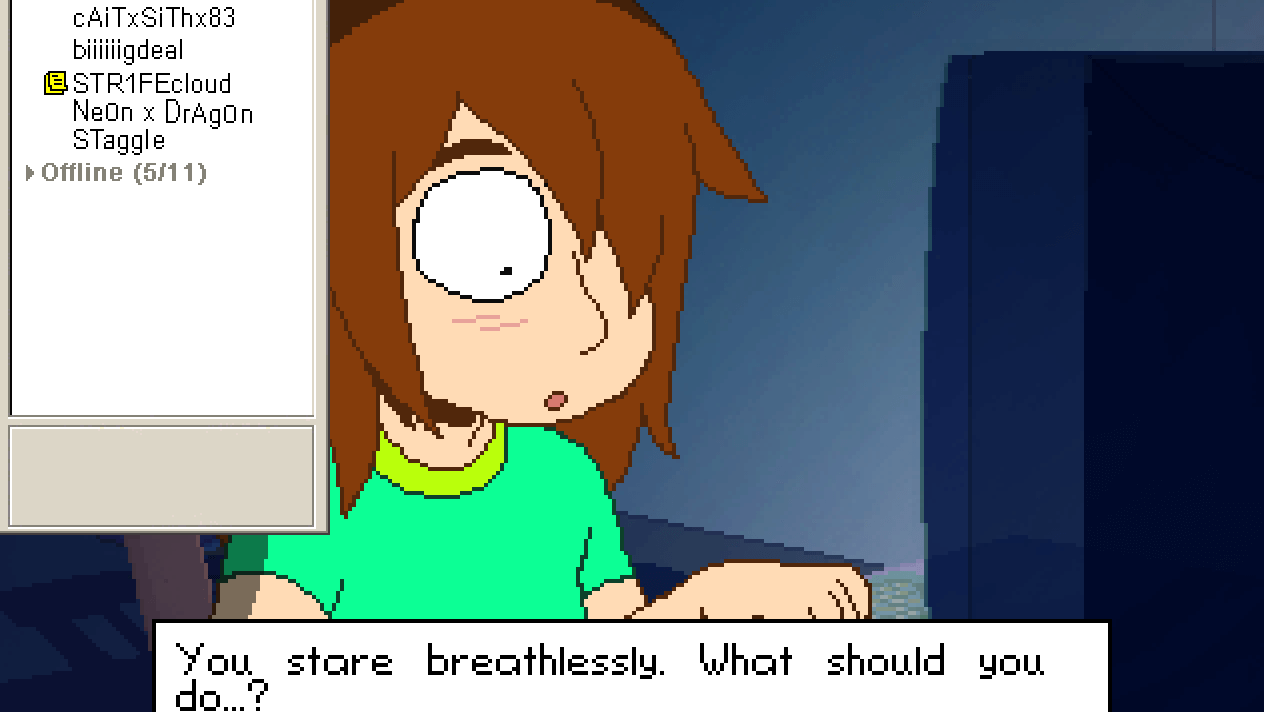Screenshot: Perfect Tides
Every Friday, A.V. Club staffers kick off our weekly open thread for the discussion of gaming plans and recent gaming glories. But of course, the real action is down in the comments, where we invite you to answer our eternal question: What Are You Playing This Weekend?
Let’s start with a scorecard: In the five or so hours it took me to play through
Perfect Tides—the gorgeous new adventure game from
Octopus Pie author and illustrator Meredith Gran, and her new studio, Three Bees, Inc.—I cried twice, laughed a few dozen times, and said “Oh, god, no, don’t act like I used to!” more often than I care to admit.
Built on the bones of classic adventure games of yesteryear, Perfect Tides drops players into the head of Mara Whitefish, a 15-year-old girl who endeavors to remind everyone she knows that she will soon be 16. Mara lives in a small U.S. island community in the far-distant era of the year 2000, where her major obsessions are writing fanfiction online, warring with her older brother, and wondering at every moment why every other person she knows seems to have a better vantage point on both their own lives, and hers.
Illustrated in a blend of Gran’s familiar style (thrillingly imported into animation, as well as used for character portraits), and the more retro-inspired look of old-school LucasArts or Sierra titles, Perfect Tides tracks four seasons of Mara’s life as she comes of age, if not necessarily maturity, in the titular community. Players will control her as she navigates the dawning interest of boys, wanted and not; the realness of friendships born from proximity, forged in shared experience, and tested by the world at large; and that thing where you’re stuck in an online conversation with someone you kind of hate, because you’ll be fucked if you let this asshole get the final word.
Perfect Tides seduces first with its visuals, which are colorful, sparse, melancholy, and gorgeous. But it’s in the writing, and the capturing of the teen experience, that it lingers. At the heart of it is Mara, whose animations and facial expressions are frequently cartoonish, but who defies, at every turn, any effort to transform her into a cartoon. At the same time, the game’s specificity is frequently staggering, whether in the casual cruelty of a kid lashing out at a well-meaning parent, or in a hilariously on-model riff of that cutscene from Final Fantasy VII.
Anyone familiar with Gran’s work—that is, who spent a decade watching her online comic Octopus Pie develop from a gag-heavy strip about hipsters and roommate troubles in New York, into one of the richest explorations extant of the horrors and beauties of being a person in a world full of people—will be in familiar territory here. Gran’s writing here, as there, is often silly, full of jokes and strange asides—until it’s time to casually, poetically smash your heart all over again. Mara herself is unpredictable, because feelings are unpredictable; she makes mistakes, misunderstands, misremembers. She frequently fucks up, in ways that are horrifying, not because her shifting motivations don’t make sense, but because they always do.
Because if the signifiers employed by Perfect Tides are rooted in a snapshot of a moment—TRL, the sound of a rumbling modem, the retro-inspired look of the game itself—then the sentiments are universal. Nostalgia has a bad rep as a blunt emotional weapon, but Gran’s aim is surgical here. It’s easy, after all, to track the highest highs and the lowest lows of the teen experience, but Perfect Tides and its author go beyond that surface simplicity. Heartbreak is easy, so to speak. But to laser in on those moments when something wonderful first starts to fade? Those first pangs, as anxiety filters out the joy, transforms transcendence into just another chance to screw it all up again? No one observes those moments better, whether it’s in the mild coolness (real? imagined?) of a lover’s reply, or the yawning space between one instant message and the next.
Those looking for a more hardcore adventure game format will come away disappointed; the game’s basic “look” verb is far more about putting the player in Mara’s head, through memory-laden descriptions of things, than helping you suss out how to attach Inventory Object A to Environmental Obstacle B. But even here, intent bleeds through: The handful of optional, more structured puzzles in Perfect Tides, are all rooted—sometimes literally—in acts of care, intentionality, and kindness. Mara’s brain screams at her nigh-incessantly, but in these moments of “puzzle solving,” she gives herself over to the process of making the world a gentler place, step by patient step. As an ethos, it’s subtle—and satisfying.
I’ll be honest, here. As someone who was, himself, a deeply confused 16-year-old in the year 2000, it’s a little hard for me to look outside myself and objectively evaluate whether Perfect Tides will hit as precisely for younger or older players as it does for me. My sense is that it will, that there’s not such a wide gulf between waiting in divine anticipation for your crush to sign on to AIM in 2000, and staring at your Instagram comments, waiting for someone, anyone, to care that you’re even alive, here in 2022. Gran and her collaborators have created much more than a mere time capsule here, some collection of museum-bound proto-memes and Carson Daly jokes. Perfect Tides is, instead, a message in a bottle—albeit one that offers rescue, instead of demanding it. It is harrowing, funny, beautiful, horrifying, and ultimately reassuring work of art.


 Keep scrolling for more great stories from A.V. Club.
Keep scrolling for more great stories from A.V. Club.